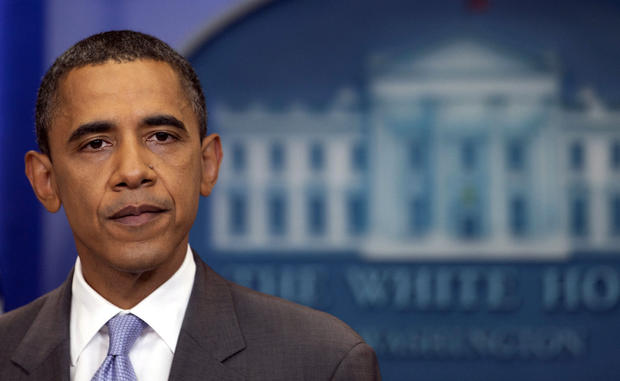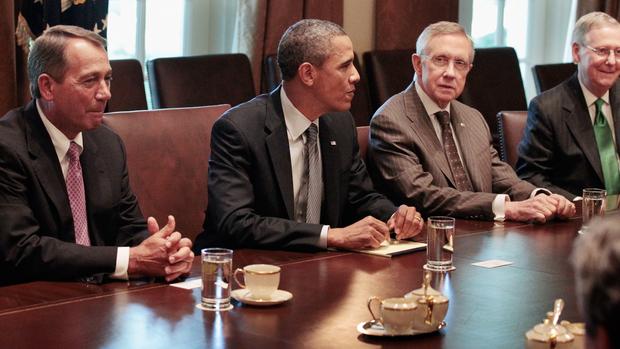President Obama: Deal reached on debt crisis
Updated Aug. 1, 7:28 a.m. EST
President Obama announced on Sunday night that an agreement with Republicans has been struck to raise the debt ceiling, preventing what would have been a first-ever default by the U.S. government on its financial obligations. The agreement now awaits approval by Congress, which could happen as early as Monday.
The deal would increase the debt ceiling by more than $2 trillion in two stages which will last through the 2012 election, a key demand for Mr. Obama and Democratic leaders.
As for spending cuts, about $1 trillion over 10 years would be cut now from the federal budget, with a similar increase in the debt limit now. In addition, a new special congressional committee made up of members from both parties and both houses of Congress would be tasked with coming up up with $1.5 trillion in further deficit reductions by Thanksgiving, which can include cuts from entitlement programs (Social Security, Medicare and Medicaid) and tax reform. If the committee fails to reach that target, or Congress doesn't pass the recommendations by the end of 2011, the debt limit could also be increased if Congress sends to the states a balanced budget amendment to the Constitution, a key demand for many conservatives in the debt fight.
If the amendment also fails, the deal calls for automatic spending cuts to defense and domestic programs totaling $1.2 trillion, with an accompanying debt limit increase. According to the White House, these cuts "would be unacceptable to many Republicans and Democrats alike" which would create pressure for Congress to come to agreement.
"Is this the deal I would have preferred?" Mr. Obama asked during his remarks. He answered his own question: "No."
But he still backed the deal, saying it "will allow us to avoid default and end the crisis that Washington imposed on the rest of America. And it will allow us to lift the cloud of debt and uncertainty."
In his remarks, Mr. Obama also still clung to his idea of a "balanced" approach to lowering U.S. debt, which would include both cuts to entitlement programs and revenue-increasing measures aimed at the rich. Though he said "everything will be on the table" in the bipartisan committee, it appears unlikely Republicans in Congress would ultimately support tax increases as part of the final package.
"Over the next few months, I'll continue to make a detailed case to these lawmakers about why I believe a balanced approach is necessary to finish the job," Mr. Obama added.
Immediately before Mr. Obama's remarks, Senate Majority Leader Harry Reid and Senate Republican Leader Mitch McConnell came to the Senate floor to announce they had an agreement.
"I know this agreement won't make every Republican happy. It certainly won't make every Democrat happy, either," Reid said. "Both parties gave more ground than they wanted to. And neither side got as much as it had hoped. But that is the essence of compromise. And the American people demanded compromise this week."
House Speaker John Boehner conducted a conference call with House Republicans on Sunday night to explain the deal to them, where he trumpeted the GOP's influence in the debate.
A participant on the call told CBS News that Boehner discussed his handling of the negotiations and how the White House had to cave on several issues, stating, "Remember how this all started: the White House demanded a "clean" debt limit hike with no spending cuts and reforms attached. We stuck together, and frankly made them give up on that."
Twitter explodes (mostly angrily) over debt deal
Boehner trumpets GOP influence in debt debate
Financial markets show optimism on debt deal
Debt deal likely to put hurt on states, poor
Special Section: America's Debt Battle
When one conference call participant told Boehner that he'd "scored an eagle on the 18th hole and won the U.S. Open," the speaker, an avid golfer, said that's how he felt.
However, it is unclear how much support the agreement will have in the House, where conservatives and liberals have both been holding fast to their principles in recent weeks. Members from both wings of the two parties have said they would not vote for parts of the agreement agreed upon from their party leaders.
One prominent Tea Party-backed Republican, Rep. Michele Bachmann, who is also running for the GOP presidential nomination, already announced her opposition to the deal shortly after it was announced.
"The President continues to press for a 'balanced approach,' which everyone knows is code for increased spending and taxes. Throughout this process the President has failed to lead and failed to provide a plan. The 'deal' he announced spends too much and doesn't cut enough. This isn't the deal the American people 'preferred' either, Mr. President. Someone has to say no. I will," Bachmann said in a statement. Bachmann was one of a few dozen Republicans who also opposed Boehner's plan, which passed the House on Friday but was rejected by the Senate.
The bill also doesn't have the support yet of House Democratic Leader Nancy Pelosi, who said in a statement that she was "reviewing" the plan.
"We all agree that our nation cannot default on our obligations and that we must honor our nation's commitments to our seniors, and our men and women in the military," she said. "I look forward to reviewing the legislation with my Caucus to see what level of support we can provide."
While Pelosi was lukewarm toward the plan, Rep. Emanuel Cleaver, chairman of the Congressional Black Caucus, was vociferous in opposition, calling it a "sugar-coated Satan sandwich."
Votes on the plan in the House and Senate are expected soon ahead of the August 2 deadline to increase the debt limit or risk default, but are not yet scheduled as members of both houses review the deal. The Senate will likely vote first as party leaders in the House try to corral the necessary votes.


